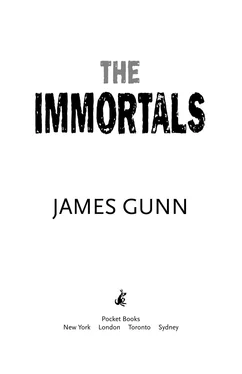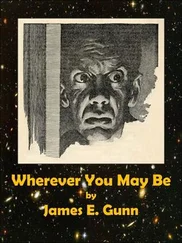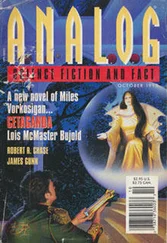Flowers tore his hand loose and stuck it into his coat pocket onto the solid reassurance of the needle gun.
Glimmering whitely in the dark rectangle of the door was a ghost of a face. “Leah?” it said. It was a girl’s voice. “I thought it was you. Give me your hand. Let me hold it for a moment. I thought I would never get through the night…”
“There now,” said Leah. She put out a hand toward the face. “You’re going to be all right. Don’t let yourself believe anything else.”
Flowers snapped on the light of the black bag. It hit the girl in the doorway like a blow; she recoiled, moaning, her arm over her eyes.
Flowers turned the light off—he had seen enough. The girl, in her thin, mended nightdress, was a bundle of bones wrapped tautly in pale skin. Except for two feverish spots of color in her cheeks, her face was dead-white.
She was dying of tuberculosis.
Tuberculosis. The white plague. It had made a new assault on humanity a century ago, when the old bacilli had developed immunity to the drugs that had once threatened to wipe it out. But today! Why do they do it!
“Go up and stay with Phil,” Leah said. “He needs you. He’s had a stroke, but he’s better now.”
“All right, Leah,” the girl said. Her voice seemed stronger, more confident. She slipped past them silently and climbed the stairs.
“What’s the matter with them?” Flowers’s voice was strained and puzzled. “Tuberculosis is no problem. We have narrow-band antibiotics that can cure it easily. Why do they let themselves die?”
She stopped in front of the worm-eaten plywood partition and raised her face toward him. “Because it’s cheaper. It’s all they can afford.”
“Cheaper to die?” Flowers exclaimed incredulously. “What kind of economy is that?”
“The only kind of economy they know. The only kind the hospitals will let them practice. You’ve made good health too expensive. A few months of bed rest,” she said wearily, “a hundred grams of neo-dihydrostreptomycin, a thousand grams of PAS, perhaps some collapsed-lung therapy, some rib resections. That girl has never seen more than fifty dollars all at once. If she lived to be a hundred she couldn’t save half the money necessary for the treatment. She’s got children to support. She can’t stop working for a day, much less for months—”
“There are clinical contracts,” Flowers said impatiently.
“They don’t cover the kind of treatment she needs,” Leah said wistfully. A door opened behind her. “Good night, Medic.” Then she was gone.
At the door he turned back impetuously, words pouring to his lips: If there isn’t enough to go around, who are you going to treat—the indigent or the prosperous, the wasters or the savers, the bottomless pits or those who can finance the future, more medicine, more health for everyone?
But the words died on his lips. The panel in the partition had come ajar. In the room behind it was a battered old aluminum chaise lounge—Twentieth Century Modern. An old man was propped upright in it, so straight and still that Flowers thought for a moment the man was dead. He was a very old man. Flowers thought that he had never seen a man as old, although geriatrics was one of the Medical Center’s leading specialties. His hair was pure white and thick; his face was seamed, like old leather, the flesh sagging away from the strong facial bones.
Beside the chair Leah had sunk to her knees. She had one of the bony hands in hers, pressed to her cheek, her eyelids closed over their clouded corneas.
Flowers found himself standing in the doorway, the panel swinging noiselessly away from him. There was something familiar about that old face, something he couldn’t place, pin down. As he was thinking about it, he noticed with a shock that the old man’s eyes had opened. It was like a return from the dead. The old eyes had life in them, faded brown though they were, and the wrinkled old skin seemed to smooth and grow firm. The body warmed and grew strong as the face smiled gently.
“Come in, Medic,” the old man whispered.
Leah’s face came up, her sightless eyes open; she turned toward him. She smiled, too. It was a warming thing, like sunlight.
“You came back to help,” Leah said.
Flowers shook his head slowly and then remembered that she couldn’t see. “There’s nothing I can do.”
“There’s nothing anyone can do,” the old man whispered. “Even without your gadgets, Medic, you know what’s wrong with me. You can’t mend a whole body, not with all your skill and all your fancy instruments. The body wears out. With most of us it happens part by part. With a few it goes all at once.
“You could give me a new heart from some unfortunate defaulter, but my arteries would still be thickened with arteriosclerosis. And if, somehow, you replaced those without killing me, I would still have a fibrotic liver, scarred lungs, senile ductless glands, probably a few carcinomas. And even if you gave me a new body, you still couldn’t help me, because down deep, where your knives can’t reach and your instruments can’t measure, is the me that is old beyond repair.”
When Leah turned her face back toward Flowers, he was shocked to see tears trickling from the blind eyes. “Can’t you do something?” Her voice broke. “Aren’t you good for anything?”
“Leah!” Even the old man’s whisper was reproof.
“It leaves a permanent recording in the ambulance library,” Flowers explained reasonably. “I can’t afford that; neither can you.”
She pressed her forehead fiercely against the back of the old man’s hand. “I can’t stand it, Russ. I can’t bear to lose you.”
“Tears are wasted on a man who has outlived his generation,” Russ said, “and almost his own era.” He smiled at Flowers; it was almost a benediction. “I’m one hundred and twenty-five years old.” He drew his hand gently from Leah’s firm young hands and folded his across his lap. They lay there as if they no longer belonged to him. “That’s a long time.”
Leah stood up angrily. “There must be something you can do—with all your magnificent knowledge, all the expensive gadgets we bought you!”
“There’s the elixir,” he said thoughtlessly.
Russ smiled again, reminiscently perhaps. “Ah, yes—the elixir. I had almost forgotten. Elixir vitae.”
“Would it help?” Leah demanded.
“No,” Flowers said firmly.
He had said too much already. Laymen weren’t equipped for medical information; it confused them; it blurred the medical picture. What patients needed more than anything else was not an understanding of their conditions but implicit faith in their doctors. When every treatment is familiar, none is effective. It is better for medicine to be magical than to be commonplace.
Besides, the elixir was still only a laboratory phenomenon. Perhaps it would never be more than that. The stuff was a synthesis of a rare blood protein—a gamma globulin—which had been discovered in the bloodstreams of no more than a handful of persons in the whole world. This protein, this immunity factor, seemed to pass on its immunity as if death itself were a disease…
“A tremendously complicated process,” he said. “Prohibitively expensive.” He turned accusingly toward Russ. “I can’t understand why you didn’t have new corneas grafted onto her eyes.”
“I couldn’t take the sight of anyone else,” Leah said softly, reproachfully.
“There’s accidental deaths,” Flowers pointed out.
“How can the recipient be sure?”
“Don’t you want her to see?” Flowers demanded of Russ.
“If wanting were enough,” the old man whispered, “she would have had my eyes many years ago. But there’s the expense, my boy. It all comes back to that.”
Читать дальше












